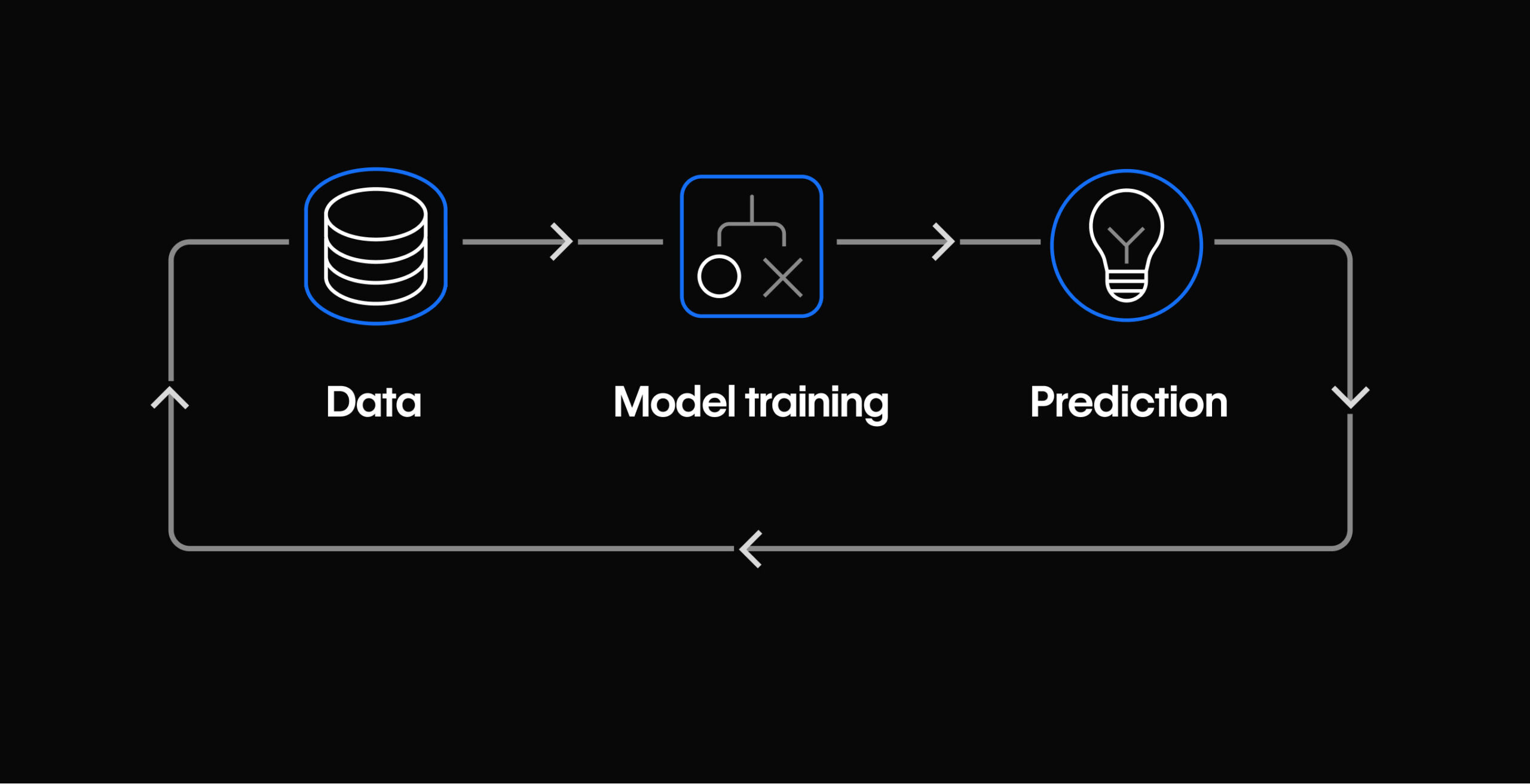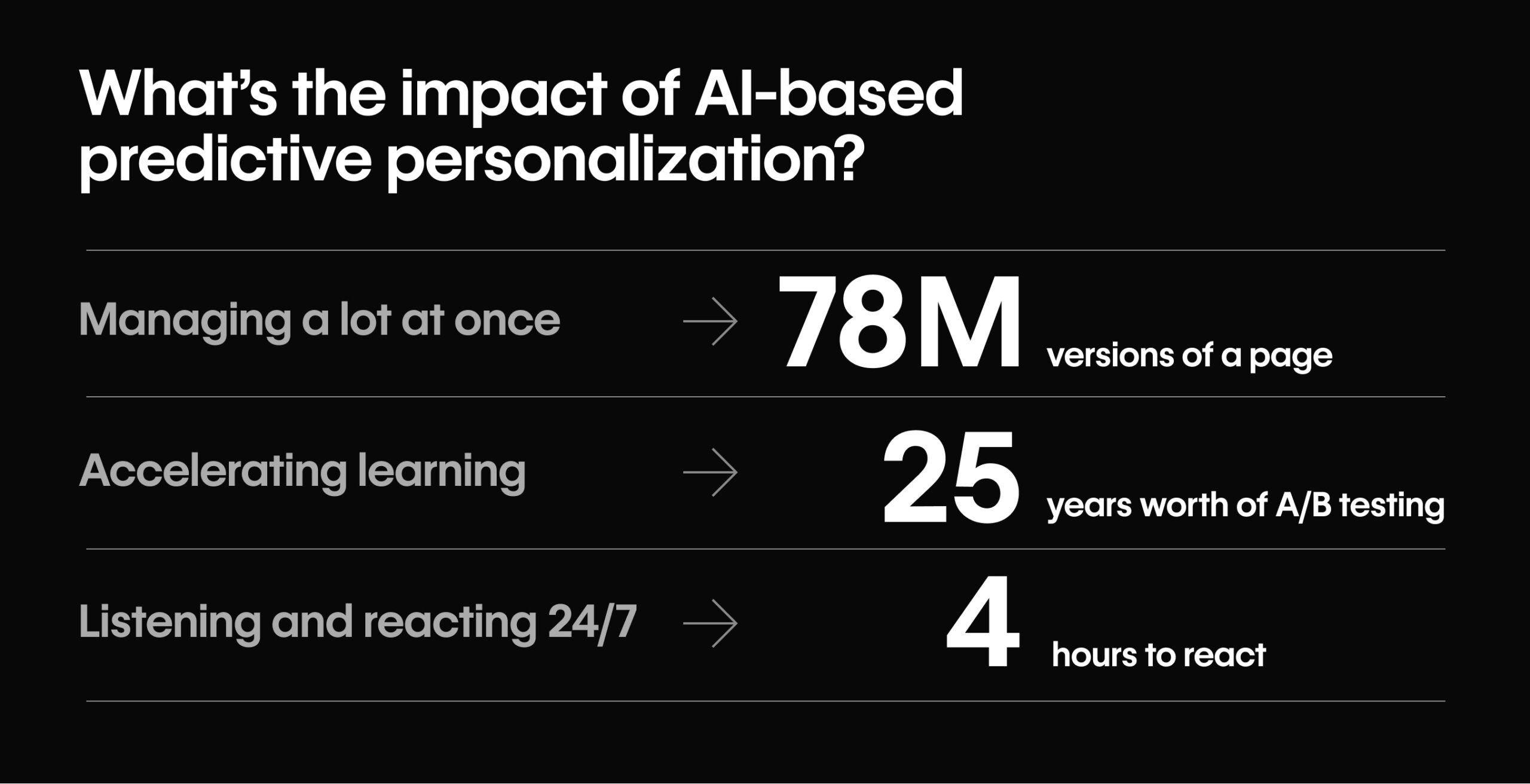Our view at Stack - Simplify web development with Webflow, reduce costs, and deliver professional results. No-code, responsive, and SEO-friendly. Explore your creative potential!
As a marketer responsible for website personalization, you’re typically managing multiple tests with tedious setup to make your programs run smoothly.
And, oftentimes, managing these tests and interpreting their results takes away from the things that actually move the needle — like brainstorming and strategizing so that you can better understand and connect with your target audience.
While this is a reality for many marketing teams, it doesn’t have to be.
What if you could dedicate more of your time to creating meaningful content for your audience that resonates with their needs? What if you could have the space to develop strategic initiatives that drive revenue, instead of executing on something half-baked? What if instead of doing things manually, automation could take care of tedious, time-consuming tasks?
The good news? This is all possible with the help of AI. AI can do all of that and more while helping you accelerate personalization results and drive conversions and revenue.
Now let’s take a closer look at how AI in website personalization works and how it can benefit your team.
What is AI?
To set the groundwork, AI is generally defined as machines simulating human intelligence. Further, machine learning is a type of AI that helps software applications more accurately predict outcomes. It works by taking data, training an algorithm, creating a prediction, and then running it in the real world. This process runs in a continuous loop, constantly taking in and learning from new data.

We see many examples of AI in our everyday lives, whether we realize it or not. A few common examples include social media algorithms, predictive searches, and recommendations on streaming services. There are many different ways we use AI in marketing as well, ranging from email automation to real-time personalization. AI empowers marketers by reducing manual work and automating processes — and most importantly — it enables marketers to spend more time doing what they do best — understanding their target audience, developing strategy and hypotheses, and generating creative ideas to appeal to their audience to incorporate into their campaigns and programs.
3 common myths about AI in website personalization
Now that you have a better understanding of what AI is, let’s take a look at how it works in your website personalization program. But first, let’s separate fact from fiction and debunk somecommon myths about AI.
Myth #1: AI is too complicated to use in your personalization program
People tend to think of AI as a complicated concept that will be too difficult to implement and use in their everyday work. This is false, running an AI-based personalization program actually makes your job easier, because the solution automates much of your work and can do things at scale. Rather than running one personalization campaign at a time and waiting weeks or months for results, AI can run countless variations at once and give you results in days or even hours. Plus, these solutions are no more difficult to implement than other website personalization solutions – you typically just need to add a line of code to your website.
Myth #2: AI can completely run your personalization program
While AI is a great way to manage your personalization program, it still needs your creative ideas in order to deliver personalized experiences to website visitors. The combination of AI technology and human creativity is what makes a website personalization strategy the most effective, leading to better customer experiences and higher conversion rates.
Myth #3: Everyone talking AI is telling you the truth
Many companies use AI as a buzzword but often overpromise on what their solution can do in terms of machine learning. Some companies promising AI actually don’t use any at all, while others may provide a data scientist as a service to build some kind of AI model manually. The latter option does create real AI but, since the model is built manually, it is likely not regularly updated or optimized. This doesn’t mean AI is untrustworthy, but it’s important to carefully vet any AI-based solution before making a purchase decision.
Questions you should ask when assessing AI-based solutions include:
- What does the system focus on? Is it optimizing directly for the key metrics you’ve indicated? Or, is it simply providing data or automation that fill a specific task in your overall process?
- How does the system learn? Does it require a lot of data upfront before the system can start making predictions and take action? Or does it start learning in real time as visitors engage with your site?
- Is the system transparent? Can you see the personalization decisions it’s making, and can you access the data–your data–reflecting these decisions?
Benefits of AI in website personalization
Now that you know what AI is and what it’s not, let’s dive into the benefits of using artificial intelligence in your personalization program.
- Reduced campaign management: With traditional A/B testing, the majority of your time is spent checking your campaigns to see whether they’ve reached statistical significance. But with an AI-based personalization program, all of that tedious campaign management is done for you. This means your team has more time to analyze results and brainstorm more creative ideas for future tests.
- Accelerated learning: Since AI allows you to do things at scale, you can dramatically accelerate your learnings from your website personalization program. By running more campaigns at once, you’ll gain a greater understanding of how different messages resonate with your audience. AI-based personalization also yields faster results than traditional solutions, with some tests declaring winners in hours or days.
- Increased conversions and revenue: With an AI-based personalization program, you’re able to deliver a more tailored experience to each unique website visitor. By providing your website visitors with messaging and content that makes sense for them, you’ll improve the customer experience and therefore drive more conversions and revenue.
Two common approaches to personalization with AI
The benefits of AI in website personalization are clear, and there are multiple approaches you can choose from to personalize your website and drive more conversions. Here are two common approaches you might consider:
- Rules-based personalization is where you create “if this, then that” statements for various segments of your target audience. With rules-based personalization, there are often three main components: defining the audience the rules apply to, creating the experience this specific audience will see on your site, and determining which pages the rules will apply to. While AI does help to automate your personalization program with this approach, there is quite a bit of manual work involved in coming up with personalization ideas and then creating the rules.
- Predictive personalization goes a step beyond rules-based personalization by using machine learning to predict what will be the best experience to show each website visitor. Rather than having to manually set up rules, machine learning automatically predicts which is the best combination of your personalization ideas to show each visitor to deliver the optimal experience for them. The machine is constantly learning as it runs your campaigns, and can even update the experience as a visitor’s behavior changes.
With AI-based predictive personalization, your team can vastly improve the customer experience and drive better results. Just see how other marketers have succeeded using a predictive personalization tool:

Using AI to personalize your website
Incorporating AI into your website personalization program is one of the best ways to fast-track success. Harnessing the power of machine learning to serve the most personalized experience to each unique website visitor will ensure an increase in conversions and revenue.
Leveraging an AI tool amplifies not only your marketing team’s bandwidth, but also the impact that their unique campaign ideas can make. As visitor behavior changes, AI automatically adapts to meet these changes to continuously deliver the best personalized experience for each unique website visitor.
To learn more about using AI to create a highly personalized website experience for your customers and prospects, get in touch with our team today.
If Webflow is of interest and you'd like more information, please do make contact or take a look in more detail here.
Credit: Original article published here.
